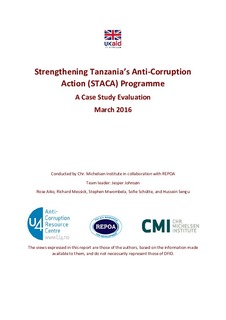| dc.description.abstract | This report summarises the findings of the independent evaluation of DfID’s Strengthening Tanzania’s Anti-Corruption Action (STACA) programme conducted by a team from the U4 Anti-Corruption Resource Centre (U4) at the Chr. Michelsen Institute (CMI) and the Tanzanian Research for Poverty Alleviation (REPOA). The Terms of Reference stressed that the purpose of the evaluation was to promote learning, so the approach differs from the typical end-of-term review in focussing on six cases rather than the programme in its entirety. This evaluation analyses the results achieved to date, the programme’s theory of change, and the challenges and successes in making a complex anti-corruption and governance programme such as STACA work. STACA stands out as one of the first programmes delivered by the aid community that sought to go beyond support to individual law enforcement institutions and have a holistic vision for strengthening the anti-corruption sector. With this programme, the Department for International Development (DFID) showed ambition and that it had listened to expert advice when developing the early concept for the programme.
This evaluation shows that STACA has already proven its relevance and has been effective in reaching a number of key self-defined performance indicators such as an increase in conviction rates. However, the programme has not been effective in reaching its main outcome: better processing of criminal cases between the different law enforcement institutions in Tanzania. Some decisions involving the management of the programme lowered its efficiency. It is premature to fully assess the sustainability and impact of the programme when most activities have been in implementation mode for only 2-3 years, and the indications vary across cases. However, if the recommendations provided below are followed, STACA has the potential to bring about meaningful and sustainable impact in the fight against corruption in Tanzania. For that to | |
